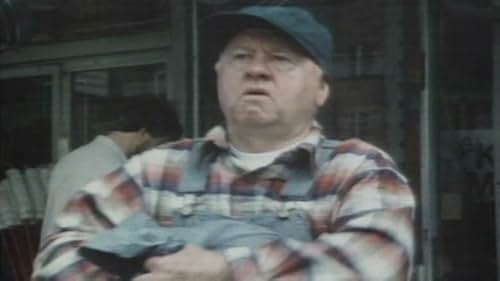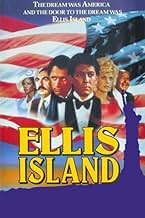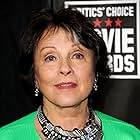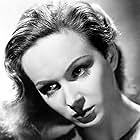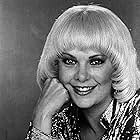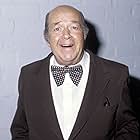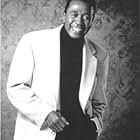The lives and struggles of some of the countless immigrants who arrived on Ellis Island during the 19th century in search of the American Dream.The lives and struggles of some of the countless immigrants who arrived on Ellis Island during the 19th century in search of the American Dream.The lives and struggles of some of the countless immigrants who arrived on Ellis Island during the 19th century in search of the American Dream.
- Won 1 Primetime Emmy
- 2 wins & 7 nominations total
Browse episodes
Storyline
Did you know
- TriviaThis was Richard Burton's final performance. It was filmed after 1984 (1984), his final theatrical film. He only agreed to play a supporting role in this television series because his daughter, Kate Burton, was in the cast. Debilitated by years of alcohol abuse, his difficulty remembering his lines required masterful editing to manipulate a successful performance from him.
- ConnectionsFeatured in The 37th Annual Primetime Emmy Awards (1985)
Featured review
During the golden age of the television mini-series (1975-1988), network TV produced dozens of epic dramas covering everything from the plight of slaves in the Civil War to the plight of Jewish prisoners of the Holocaust. "Ellis Island" was promoted as a tribute to all of those brave people who came to the United States from Europe to pursue the American dream between the late 1800's and the start of World War I. The story focuses on two men and two women who come to America to pursue their dreams and find more than they've bargained for. Jake Ruben (Peter Riegert) is a Russian Jew who escaped from his burning village and has arrived in America, hoping to become a popular composer; Marco Santorelli (Greg Martyn, now known as Greg Martin), an Italian immigrant and former gardner to famous actress Maude Charteris (Faye Dunaway), has arrived in New York, hoping to become educated and move up in the business world. Feisty Bridgette O'Donnell (Alice Krige) and her more innocent sister Georgie O'Donnell (Judi Bowker) come to America to escape the law after Bridgette helps Irish rebels in a kidnapping scheme. Circumstances bring them together on the ship to America where Marco falls for Georgie but circumstances beyond his control prevent him from pursuing her.
Over the course of about six hours, we are introduced to other characters who cross their paths: Bridgette and Georgie's aunt and uncle (Milo O'Shea and Lila Kaye); Senator Phipps Ogden (Richard Burton in one of his final roles), the man who marries Maude Charteris and leads Marco into a political career by marrying him off to his rebellious plain jane daughter, Vanessa (Kate Burton, his real-life daughter); Ragtime piano player Roscoe Haines (Ben Vereen) and music agent Abe Shulman (Stubby Kaye) who assist Jake in pursuing his dream of becoming a Broadway composer; and finally, musical comedy star Nellie Byfeild (Ann Jillian) who marries Jake to further her own career. There are others who come into the storyline later on (such as Emma Sams as a dance teacher, Claire Bloom as her mother, Cherie Lunghi as a Bohemian artist, Melba Moore as a Cotton Club type performer), but these are the main characters who handle the majority of the plot. Then, there are also some surprise appearances as well. Liam Neeson, way before he became famous, plays an Irishman who knows about Bridgette's past, and even more briefly, Natasha Richardson as a prostitute.
While the first half of the mini-series focuses on the struggles of the immigrant's first years in America, the second half quickly moves into the area of where their successes take them. We only see briefly the squalour these immigrants lived in, and before you can say "Upper East Side", they have moved not only up past middle class, but into the lap of luxary. There are glimpses of some of the real-life celebrities of the time (brief appearances by actors portraying Al Jolson and Florenz Ziegfeld, plus one funny bit involving an up and coming real-life Broadway composer), and there are also some nice little musical numbers sung by Melba Moore and Ann Jillian. (Her "Ziegfeld Follies" production number seems small compared to what the real "Follies" really were like, and her spoof of the bad Florence Nightingale musical brings on groans, not chuckles; Moore fares better with her "Raggedy Ragtime Man" number, although Jillian is outstanding in her dramatic scenes, a performance which won her an Emmy Nomination.)
More fascinating is the Marco Santorelli storyline; Faye Dunaway, who won a Golden Globe for her performance, proves that she can do more than just be melodramatic; She plays all sides of the spectrum of this character. We get to see her love, her lust, her greed, her hunger, and her own ambition. She obviously decided to underplay the part to take away some of the bad press she had with "Mommie Dearest" and such clinkers as "Supergirl" and "A Wicked Lady". This should have taken her career into better parts, but it would be a decade before her career would begin to recover. Richard Burton is perfectly matched with Dunaway; They are a class act. Kate Burton, now a respected Broadway veteran, brings a complexity to the troubled Vanessa who goes from plain jane artist to shy politician's wife to reformed alcoholic, and ends up in a scandal of her own that could destroy Marco's career. The scenes involving Burton and British actress Cherie Lunghi are a fascinating look at a part of early 20th Century New York that has not been dealt with. Lunghi may be more familiar to audiences with her brief bits in films such as "The Mission" and "Mary Shelley's Frankenstein", but will definately always be remembered for her showy performance in this and as Guenevere in "Excalibur".
Judi Bowker and Alice Krige are perfectly cast as sisters. They are as different as night and day, but seem like they could be related. As their aunt and uncle, Milo O'Shea and Lilla Kaye offer excellent performances; O'Shea plays a character obviously influenced by real-life New York crook Boss Tweed from 50 years earlier, while Kaye reminds me of the lovable 30's film star, Marie Dressler. It is too bad she wasn't featured more, but there was already too much going on and too many storylines to follow. Also wasted were Ben Vereen and Melba Moore, fine with what material they have, but placed so far in the background, they are almost impossible to remember when they do show back up. Emma Sams and Claire Bloom also seem out of place here, as does 1950's British film star Joan Greenwood as an aging dance instructor. Riegert's character goes through far too many changes in a period of a decade to be believable; He does the best he can with it, but it would have been more realistic to see more of Jake and Marco's struggles rather than their quick rise to success.
When "Ellis Island" focuses on political drama and the struggles of the immigrants, it succeeds very highly; When it lapses into soap opera (Jake's affair with Sams' Violet; Bridgette's past catching up with her), it lags. There were simply too many ingredients to make it totally come together. All of the production design is outstanding; The period costumes and sets make the viewer feel they are in pre-war New York. Some of the musical numbers seem a bit silly to represent the hits of the era, but do manage to capture the innocence of the times.
If one can overlook the shortcomings I mention above and take it as just one aspect of the immigrant lifestyle of that time, it can be an interestingly nostalgic look back at something many of our grandparents might have experienced. It also reminds us of how much has changed in such a short time in history. Films like "Gangs of New York" and stage musicals like "Ragtime" delve into different aspects of their lives.
Over the course of about six hours, we are introduced to other characters who cross their paths: Bridgette and Georgie's aunt and uncle (Milo O'Shea and Lila Kaye); Senator Phipps Ogden (Richard Burton in one of his final roles), the man who marries Maude Charteris and leads Marco into a political career by marrying him off to his rebellious plain jane daughter, Vanessa (Kate Burton, his real-life daughter); Ragtime piano player Roscoe Haines (Ben Vereen) and music agent Abe Shulman (Stubby Kaye) who assist Jake in pursuing his dream of becoming a Broadway composer; and finally, musical comedy star Nellie Byfeild (Ann Jillian) who marries Jake to further her own career. There are others who come into the storyline later on (such as Emma Sams as a dance teacher, Claire Bloom as her mother, Cherie Lunghi as a Bohemian artist, Melba Moore as a Cotton Club type performer), but these are the main characters who handle the majority of the plot. Then, there are also some surprise appearances as well. Liam Neeson, way before he became famous, plays an Irishman who knows about Bridgette's past, and even more briefly, Natasha Richardson as a prostitute.
While the first half of the mini-series focuses on the struggles of the immigrant's first years in America, the second half quickly moves into the area of where their successes take them. We only see briefly the squalour these immigrants lived in, and before you can say "Upper East Side", they have moved not only up past middle class, but into the lap of luxary. There are glimpses of some of the real-life celebrities of the time (brief appearances by actors portraying Al Jolson and Florenz Ziegfeld, plus one funny bit involving an up and coming real-life Broadway composer), and there are also some nice little musical numbers sung by Melba Moore and Ann Jillian. (Her "Ziegfeld Follies" production number seems small compared to what the real "Follies" really were like, and her spoof of the bad Florence Nightingale musical brings on groans, not chuckles; Moore fares better with her "Raggedy Ragtime Man" number, although Jillian is outstanding in her dramatic scenes, a performance which won her an Emmy Nomination.)
More fascinating is the Marco Santorelli storyline; Faye Dunaway, who won a Golden Globe for her performance, proves that she can do more than just be melodramatic; She plays all sides of the spectrum of this character. We get to see her love, her lust, her greed, her hunger, and her own ambition. She obviously decided to underplay the part to take away some of the bad press she had with "Mommie Dearest" and such clinkers as "Supergirl" and "A Wicked Lady". This should have taken her career into better parts, but it would be a decade before her career would begin to recover. Richard Burton is perfectly matched with Dunaway; They are a class act. Kate Burton, now a respected Broadway veteran, brings a complexity to the troubled Vanessa who goes from plain jane artist to shy politician's wife to reformed alcoholic, and ends up in a scandal of her own that could destroy Marco's career. The scenes involving Burton and British actress Cherie Lunghi are a fascinating look at a part of early 20th Century New York that has not been dealt with. Lunghi may be more familiar to audiences with her brief bits in films such as "The Mission" and "Mary Shelley's Frankenstein", but will definately always be remembered for her showy performance in this and as Guenevere in "Excalibur".
Judi Bowker and Alice Krige are perfectly cast as sisters. They are as different as night and day, but seem like they could be related. As their aunt and uncle, Milo O'Shea and Lilla Kaye offer excellent performances; O'Shea plays a character obviously influenced by real-life New York crook Boss Tweed from 50 years earlier, while Kaye reminds me of the lovable 30's film star, Marie Dressler. It is too bad she wasn't featured more, but there was already too much going on and too many storylines to follow. Also wasted were Ben Vereen and Melba Moore, fine with what material they have, but placed so far in the background, they are almost impossible to remember when they do show back up. Emma Sams and Claire Bloom also seem out of place here, as does 1950's British film star Joan Greenwood as an aging dance instructor. Riegert's character goes through far too many changes in a period of a decade to be believable; He does the best he can with it, but it would have been more realistic to see more of Jake and Marco's struggles rather than their quick rise to success.
When "Ellis Island" focuses on political drama and the struggles of the immigrants, it succeeds very highly; When it lapses into soap opera (Jake's affair with Sams' Violet; Bridgette's past catching up with her), it lags. There were simply too many ingredients to make it totally come together. All of the production design is outstanding; The period costumes and sets make the viewer feel they are in pre-war New York. Some of the musical numbers seem a bit silly to represent the hits of the era, but do manage to capture the innocence of the times.
If one can overlook the shortcomings I mention above and take it as just one aspect of the immigrant lifestyle of that time, it can be an interestingly nostalgic look back at something many of our grandparents might have experienced. It also reminds us of how much has changed in such a short time in history. Films like "Gangs of New York" and stage musicals like "Ragtime" delve into different aspects of their lives.
- mark.waltz
- Jan 4, 2004
- Permalink
- How many seasons does Ellis Island have?Powered by Alexa
Details
Contribute to this page
Suggest an edit or add missing content


